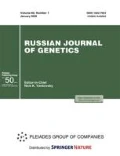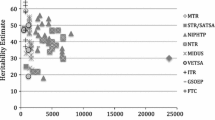Abstract
Quality of life and one’s subjective evaluation of one’s own happiness and well-being are the conventional focus of psychology and sociology. However, a genetic factor has recently been found to affect the subjective evaluation of well-being. The contribution of heredity to a personal level of happiness and life satisfaction has been estimated at 30–50% in twin studies. Individual genes associated with these traits have been identified, but the available data are rather discrepant. In this work, alleles of the monoamine oxidase A gene (MAOA) were tested for association with well-being components, such as happiness, health, dangers of living environment, and stress, in Russian men. Trait assessments were based on questionnaires filled out as part of the World Values Survey. It is shown that, among the uVNTR-3R allele carriers, the proportion of men who have high levels of stress, feel unhappy, and live in unsafe environments is lower. The results are discussed in the context of the gene plasticity concept, which provides a possible explanation for how expression of genes related to behavior changes in different environmental conditions.
Similar content being viewed by others
References
Steptoe, A. and Wardle, J., Enjoying life and living longer, Arch. Int. Med., 2012, vol. 172, no. 3, pp. 273–275.
Bartels, M., Genetics of wellbeing and its components satisfaction with life, happiness, and quality of life: a review and meta-analysis of heritability studies, Behav. Genet., 2015, vol. 45, no. 2, pp. 137–156. doi 10.1007/s10519-015-9713-y
Frey, B.S., Happy people live longer, Science, 2011, vol. 331, no. 6017, pp. 542–543. doi 10.1126/science. 1201060
Kahneman, D. and Deaton, A., High income improves evaluation of life but not emotional well-being, Proc. Natl. Acad. Sci. U.S.A., 2010, vol. 107, no. 38, pp. 16489–16493. doi 10.1073/pnas.1011492107
Myers, D.G. and Diener, E., Who is happy?, Psychol. Sci., 1995, vol. 6, pp. 10–19.
Bartels, M. and Boomsma, D.I., Born to be happy? The etiology of subjective well-being, Behav. Genet., 2009, vol. 39, no. 6, pp. 605–615. doi 10.1007/s10519-009-9294-8
Rietveld, C.A., Cesarini, D., Benjamin, D.J., et al., Molecular genetics and subjective well-being, Proc. Natl. Acad. Sci. U.S.A., 2013, vol. 110, no. 24, pp. 9692–9697. doi 10.1073/pnas.1222171110
Matsunaga, M., Isowa, T., Yamakawa, K., et al., Genetic variations in the human cannabinoid receptor gene are associated with happiness, PLoS One, 2014, vol. 9, no. 4. P: e93771. https://doi.org/10.1371/journal. pone.0093771.
Fredrickson, B.L., Grewen, K.M., Coffey, K.A., et al., A functional genomic perspective on human wellbeing, Proc. Natl. Acad. Sci. U.S.A., 2013, vol. 110, no. 33, pp. 13684–13689. doi 10.1073/pnas.1305419110
Chen, H., Pine, D.S., Ernst, M., et al., The MAOA gene predicts happiness in women, Prog. Neuro-Psychopharmacol. Biol. Psychiatry, 2013, vol. 40, pp. 122–125. https://doi.org/10.1016/j.pnpbp.2012.07.018.
Sprangers, M.A., Thong, M.S., Bartels, M., et al., Biological pathways, candidate genes, and molecular markers associated with quality-of-life domains: an update, Qual. Life Res., 2014, vol. 23, no. 7, pp. 1997–2013.
Okbay, A., Baselmans, B.M., De Neve, J.E., et al., Genetic variants associated with subjective well-being, depressive symptoms, and neuroticism identified through genome-wide analyses, Nat. Genet., 2016, vol. 48, no. 6, pp. 624–633. doi 10.1038/ng.3552
De Neve, J.E., Christakis, N.A., Fowler, J.H., and Frey, B.S., Genes, economics, and happiness, J. Neurosci. Psychol. Econ., 2012, vol. 5, no. 4, pp. 193–211. http://dx.doi.org/10.1037/a0030292.
Lan, N.C., Heinzmann, C., Gal, A., et al., Human monoamine oxidase A and B genes map to Xp11.23 and are deleted in a patient with Norrie disease, Genomics, 1989, vol. 4, pp. 552–559. https://doi.org/10.1016/0888-7543(89)90279-6.
Brunner, H.G., Nelen, M., Breakefield, X.O., et al., Abnormal behavior associated with a point mutation in the structural gene for monoamine oxidase A, Science, 1993, vol. 262, pp. 578–580. doi 10.1126/science. 8211186
Sabol, S.Z., Hu, S., and Hamer, D., A functional polymorphism in the monoamine oxidase A gene promoter, Hum Genet., 1998, vol. 103, no. 3, pp. 273–279.
Ficks, C.A. and Waldman, I.D., Candidate genes for aggression and antisocial behavior: a meta-analysis of association studies of the 5HTTLPR and MAOAuVNTR, Behav. Genet., 2014, vol. 44, no. 5, pp. 427–444. doi 10.1007/s10519-014-9661-y
Liu, Z., Huang, L., Luo, X.J., et al., MAOA variants and genetic susceptibility to major psychiatric disorders, Mol. Neurobiol., 2016, vol. 53, no. 7, pp. 4319–4327. doi 10.1007/s12035-015-9374-0
Reif, A., Weber, H., Domschke, K., et al., Meta-analysis argues for a female-specific role of MAOA-uVNTR in panic disorder in four European populations, Am. J. Med. Genet., Part B, 2012, vol. 159B, no. 7, pp. 786–793. doi 10.1002/ajmg.b.32085
Fan, M., Liu, B., Jiang, T., et al., Meta-analysis of the association between the monoamine oxidase-A gene and mood disorders, Psychiatr. Genet., 2010, vol. 20, no. 1, pp. 1–7. doi 10.1097/YPG.0b013e3283351112
Rivera, M., Gutiérrez, B., Molina, E., et al., Highactivity variants of the uMAOA polymorphism increase the risk for depression in a large primary care sample, Am. J. Med. Genet., Part B, 2009, vol. 150B, no. 3, pp. 395–402. doi 10.1002/ajmg.b.30829
Meyer-Lindenberg, A., Buckholtz, J.W., Kolachana, B., et al., Neural mechanisms of genetic risk for impulsivity and violence in humans, Proc. Natl. Acad. Sci. U.S.A., 2006, vol. 103, pp. 6269–6274.
Verhoeven, F.E., Booij, L., Kruijt, A.W., et al., The effects of MAOA genotype, childhood trauma, and sex on trait and state-dependent aggression, Brain Behav., 2012, vol. 2, no. 6, pp. 806–813. doi 10.1002/brb3.96
Caspi, A., McClay, J., Moffitt, T.E., et al., Role of genotype in the cycle of violence in maltreated children, Science, 2002, vol. 297, pp. 851–854. doi 10.1126/science. 1072290
World Values Survey. http://www.worldvaluessurvey. org.
Cohen, S., Kamarck, T., and Mermelstein, R., A global measure of perceived stress, J. Health Soc. Behav., 1983, vol. 24, pp. 385–396.
Shkolnikova, M., Shalnova, S., Shkolnikov, V.M., et al., Biological mechanisms of disease and death in Moscow: rationale and design of the survey on Stress Aging and Health in Russia (SAHR), BMC Public. Health, 2009, vol. 9, p. 293. doi 10.1186/1471-2458-9-293
Glei, D.A., Goldman, N., Shkolnikov, V.M., et al., Perceived stress and biological risk: is the link stronger in Russians than in Taiwanese and Americans?, Stress, 2013, vol. 16, no. 4, pp. 411–420. doi 10.3109/10253890.2013.789015
Roff, D.A. and Bentzen, P., The statistical analysis of mitochondrial DNA: χ2 and problem of small samples, Mol. Biol. Evol., 1989, vol. 6, pp. 539–545. https://.org/. doi 10.1093/oxfordjournals.molbev. a040568
Elston, R.C. and Forthofer, R., Testing for Hardy—Weinberg equilibrium in small samples, Biometrics, 1977, vol. 33, pp. 536–542. doi 10.2307/2529370
Abramson, J.H., WINPEPI (PEPI-for-Windows): computer programs for epidemiologists, Epidemiol. Perspect. Innovations, 2004, vol. 1, p. 6.
Cohen, S. and Janicki-Deverts, D., Who’s stressed? Distributions of psychological stress in the United States in probability samples from 1983, 2006, and 2009, J. Appl. Soc. Psychol., 2012, vol. 42, pp. 1320–1334. doi 10.1111/j.1559-1816.2012.00900.x
Kim-Cohen, J., Caspi, A., Taylor, A., et al., MAOA, maltreatment, and gene-environment interaction predicting children’s mental health: new evidence and a meta-analysis, Mol. Psychiatry, 2006, vol. 11, pp. 903–913. doi 10.1038/sj.mp.4001851
Belsky, J. and Pluess, M., The nature (and nurture?) of plasticity in early human development, Perspect. Psychol. Sci., 2009, vol. 4, no. 4, pp. 345–351. doi 10.1111/j.1745-6924.2009.01136.x
Caspi, A., Sugden, K., Moffitt, T.E., et al., Influence of life stress on depression: moderation by a polymorphism in the 5-HTT gene, Science, 2003, vol. 301, no. 5631, pp. 386–389. doi 10.1126/science.1083968
Koenen, K.C., Aiello, A.E., Bakshis, E., et al., Modification of the association between serotonin transporter genotype and risk of posttraumatic stress disorder in adults by county-level social environment, Am. J. Epidemiol., 2009, vol. 169, no. 6, pp. 704–711. doi 10.1093/aje/kwn397
Author information
Authors and Affiliations
Corresponding author
Additional information
Original Russian Text © A.S. Gureev, E.D. Ananieva, A.V. Rubanovich, R.F. Inglehart, E.D. Ponarin, S.A. Borinskaya, 2018, published in Genetika, 2018, Vol. 54, No. 5.
Rights and permissions
About this article
Cite this article
Gureev, A.S., Ananieva, E.D., Rubanovich, A.V. et al. Association of MAOA-uVNTR Polymorphism with Subjective Well-Being in Men. Russ J Genet 54, 562–567 (2018). https://doi.org/10.1134/S1022795418050058
Received:
Accepted:
Published:
Issue Date:
DOI: https://doi.org/10.1134/S1022795418050058




